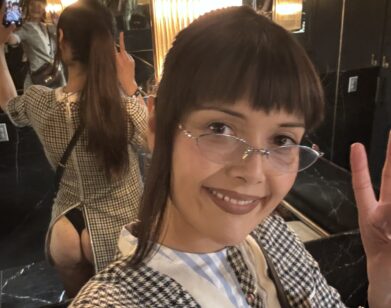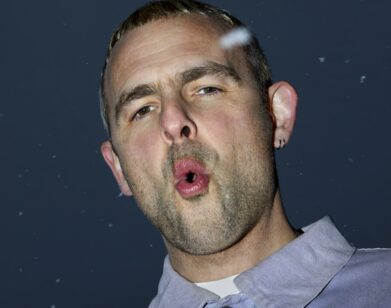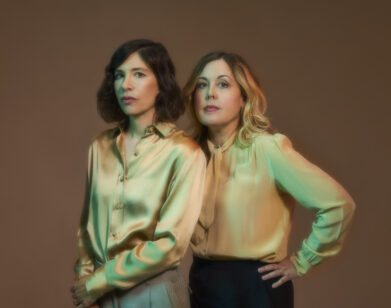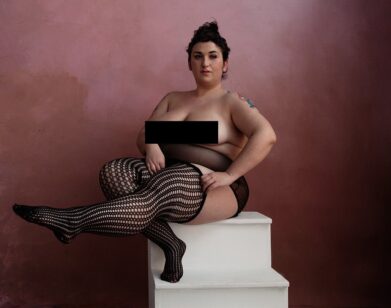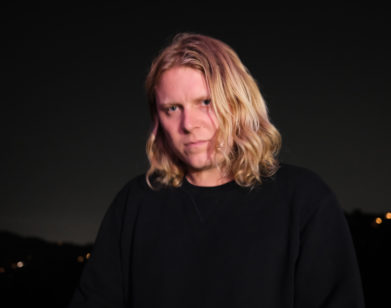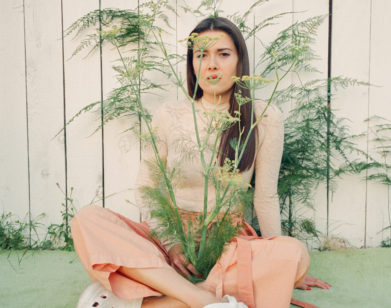in conversation
Aidy Bryant and Carrie Brownstein on Why It’s Cool to Be Angry
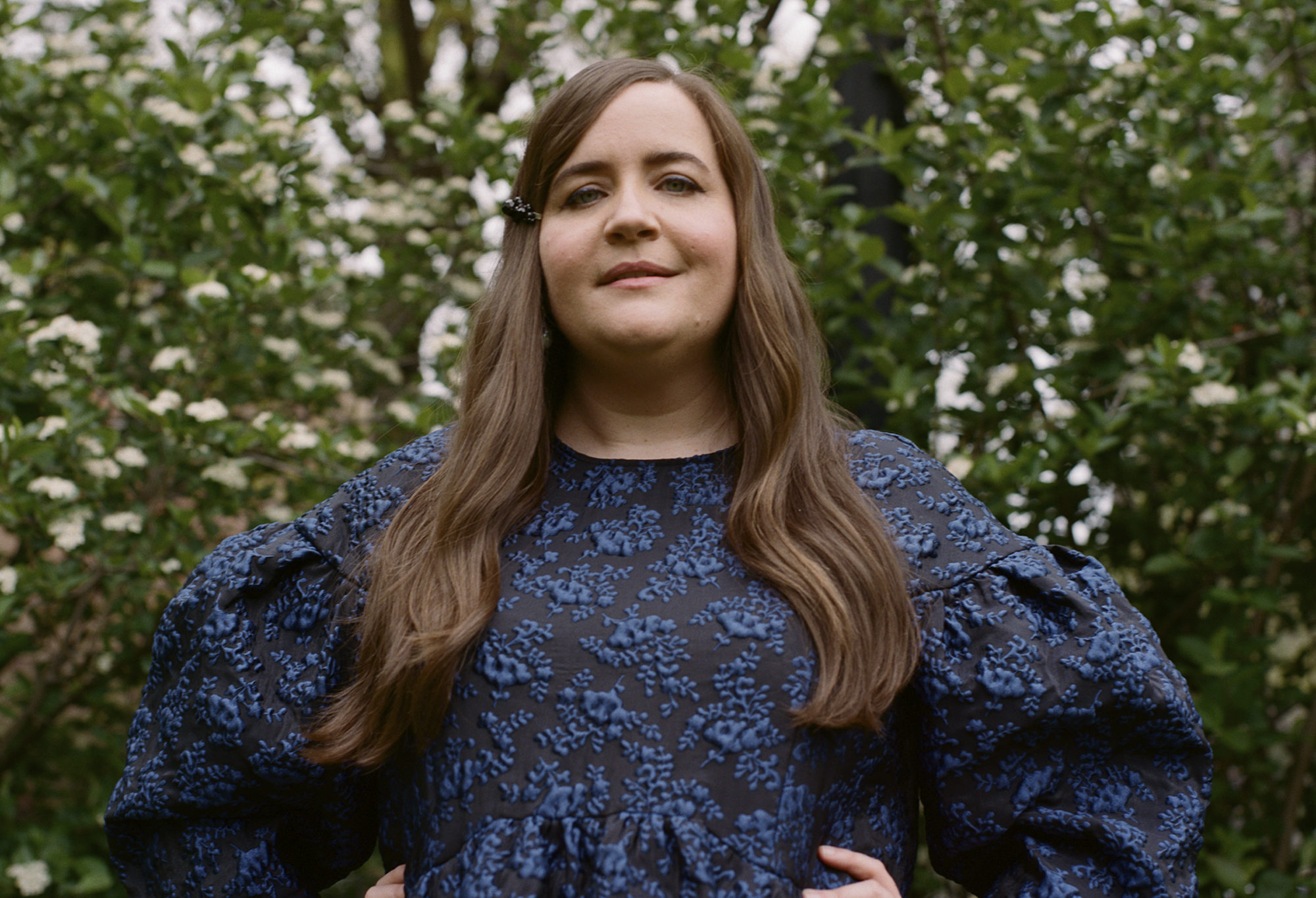
Dress by Simone Rocha.
It was the pool party that launched a thousand bikinis. In a scene from season one of Hulu’s Shrill, the comedy series loosely adapted from a memoir by the writer Lindy West, Aidy Bryant’s Annie, a struggling journalist in Portland, Oregon, attends a “Fat Babe Pool Party” in search of a story, against the advice of her curmudgeon of a boss. It’s there where we see a glimpse of freedom for Annie in a world where she is subject to an endless stream of subtle fat-shaming and an exhausting barrage of judgments. Sipping a frozen cocktail in the corner in a collared shirt buttoned to the top, she’s pulled into a group of dancing women, watching them sway their hips and bare their midriffs freely. Annie is shy at first, but as Ariana Grande’s “One Last Time” builds to an EDM crescendo, the energy takes over, and she’s bouncing up and down, punching the air, unbuttoning her blouse, and jumping into the pool. It’s the scene that brought Shrill to the forefront of the prestige comedy rankings, inspiring think pieces, oral histories, and praise from women who have, at long last, seen bodies like theirs on television—not as a punchline, but a point of pride. Quite literally, it said to them, it’s time to dive right in.
Since that episode, directed by Shaka King (Judas and the Black Messiah), Shrill has expanded into so much more than “the body-positive show.” As Annie, Bryant navigates the rocky terrain of bad boyfriends, sick parents, and online trolls. Rather than a linear triumph, her self-worth ebbs and flows, though her growth is steady. It’s a quiet evolution for both the character and the actor who writes, produces, and plays her; Bryant, known to America for her work on Saturday Night Live, in which she rotates through a carousel of characters from Ted Cruz to a literal chicken, has flexed her muscles as a dramatic actor and all-around creative force. And while Shrill was untimely canceled, leaving its third season to be its last, as Bryant tells her friend, fellow comedian, and real-life Portlander Carrie Brownstein, it’s just juice in her tank for the next thing. —SARAH NECHAMKIN
———
AIDY BRYANT: Hi!
CARRIE BROWNSTEIN: Hey! How’s it going?
BRYANT: Really good. I’m looking forward to being interviewed.
BROWNSTEIN: I’m looking forward to interviewing you. Congratulations on finishing the third and final season of Shrill.
BRYANT: Thank you! And thank you for also directing two episodes in the third and final season of Shrill.
BROWNSTEIN: You’re very welcome. It was an honor. Since you didn’t know that it was going to be your final season, was there anything that you feel is unsaid or untold in this story?
BRYANT: Well, I don’t know. We initially wrote the ending of the season to be a cliffhanger, for there to be more. But then once we got into editing it, and we knew that this series was ending, it was like, “Oh, wait, this is a cool ending for the show as a whole.” I think I probably would’ve written it differently if we knew, but I really like where it lands. Which ultimately, I think is the message of the show—there is no finish line to self- worth. It’s this ongoing thing. It just always takes work, and every time you think you’ve got it, something arises and you have to reset. But what you can change is how you deal with it and how you talk to yourself about it and how you treat yourself. And I do feel like that’s where the show ends. There’s more work to be done. There’s no finished product of, “A-plus, she’s confident!”
BROWNSTEIN: Right.
BRYANT: But she’s certainly better than where we started with her. And she has these really solid relationships to help her navigate more in the future. And I feel like that’s a nice, hopeful slash realistic note to leave it on. I would be worried that, had we known, or had all the studios and the network totally known, that we would’ve felt pressure to write some sort of “this is her fight song” kind of ending. It is very realistic, and grounded and true to the show. I feel pretty good about where it lands. That was a long answer.
BROWNSTEIN: No, it was a great answer. And I was going to say the same thing. I think there’s a different kind of pressure if you know that you’re embarking on a final season, to make some kind of thesis statement or summation, when really, as you’re saying, life asks more questions than answers. And it’s not like on our deathbeds we’re like, “I did it. And, scene.”
BRYANT: Totally.
BROWNSTEIN: Is there a show that you’re a fan of, that you loved the conclusion of?
BRYANT: This is probably such a boring answer, but I loved the end of The Sopranos. When it first ended, America was like, “What? It’s over? Was that the ending?” And then the more I sat with it, the more I was like, “It’s so perfect.” In the same way, it’s not triumphant, which I kind of like. I just think it’s very realistic. There are no winners; it’s just a constant struggle of a hellish life. Am I being depressed?
BROWNSTEIN: No, no. Between the three seasons that you’ve done, is there something palpable that you learned? Starting season three, or even starting season two, what were the things from each season that you thought, “Okay, this season we’re going to do this differently?” And I’m talking about even just logistical things. Because it’s so different than what you do on SNL. This is your show.
BRYANT: Making the show was a wholly life-changing experience, just in that it was the first time I ever saw myself as one of the bosses. I was the person in charge who has to make the decisions that affect sometimes hundreds of people who work for this production. And I took that really seriously, and that really empowered me on another level to trust my gut when things worked out, or to just know how to do it instinctually. To know you have it within you. Trust.
I would say the first season, I really learned, “Okay you can do it. But now you have to protect yourself on some level.” Because we only had six episodes, and they were very Annie focused. We didn’t have as much of a Fran storyline, and so I was literally in every single scene. And I felt, by the end of it, like I had run myself truly to beyond zero. I was involved in every producorial decision and every little prop decision, and I looked at every little thing.
The second season, I really was like, “Oh. I trust so many of the people around me. I can let go of my death grip and take a moment to be a performer right now.” And that made it so much better.
And I think for the third season it was, “Okay. We have this well-oiled machine, but it’s in COVID. How do we protect everyone and keep them safe? And beyond just protecting them, make sure that they feel emotionally supported? Because it’s fricking scary, and totally frightening. It was less about the production and getting it done, and more about, are people okay? Is everybody okay? Are we going to make this in a way that feels healthy and worthwhile? Overall, it has given me a major sense of, “Oh, I can make and run a television show in a way that is good for both the viewers and the people that work on it.” And that is a huge thing to be proud of. And so I feel very good.
BROWNSTEIN: That’s great. So based on your answer, I’m thinking, well, a couple things. One, I do think delegating is a skill that you learn when you are in a leadership role. That it’s not about hoarding power or just being in a silo—you have to learn a different kind of collaboration than just a strictly creative collaboration, like in the writer’s room or something. It truly is about that trust. When you were able to delegate and trust other people, what did that do for you as a performer? Because when I worked with you on Shrill, and when I watch Shrill, I’m always struck by what a wonderful actor you are, with a very wide and dynamic range.
BRYANT: What a beautiful compliment from a friend I respect as an actor and a director. And a writer, wow! The first season, it was all just so raw for me at times, like the pool party episode. It was like, “I’ve lifted this and I can rip it wide open.” And I feel like the second season, I was a little more thoughtful about it. Instead of being like, “I’ve got to get down into the dirty pain of body image,” I was maybe a little more focused on the story that we were trying to tell, and I had that practice from the first season under my belt. I wanted to push myself a little bit, and be pushed by directors to try on emotions that, personally, I’m less comfortable with. Especially the last episode of the second season, when I break up with Ryan—there’s some real anger there. There was something really satisfying after two seasons of seeing this person suffer with this bad boyfriend, to fight back and be angry. I don’t know that I could have done that in the first season, because I was just screaming and running with my head cut off to get through the whole thing. And also because we had never made a pilot, we went straight to series from script, from the second we started filming, we didn’t stop until the end of the first season. So there was no moment to reflect. The second season, and third, I got to have more intention, which was a really nice, slower way to think about it. Especially coming from SNL where it’s just like, “Okay, tonight you’re playing Ted Cruz. Jump up there, do it.” And you’re like, “Okay!”
BROWNSTEIN: Very different. You can ruminate on things, you can edit. There’s just more introspection and reflection when you’re writing an entire season and you can look back. It’s also a continuum, so you can look back on the last season and deepen something or lengthen something. It’s interesting what you say about anger because I think that it’s something that’s often leveled against women. Particularly women of color, but all women can be seen as “angry female.” But what I like about the way that anger came to be part of the vernacular of Annie on Shrill, was that you see that it’s a process. It’s something that almost has to be learned and embraced, and not hated in yourself. You really see the story of that emotion coming to be something that was useful for her. You said that you had more discomfort in your own life with anger. What are the ways that Annie’s anger helped you think about showing those other emotions?
BRYANT: Well, it’s really exactly what you were just saying, which is that, like many women, I’ve felt anger is an ugly emotion and I shouldn’t do that. There’s just an innate feeling that you shouldn’t be angry, you should cry or something. That’s how you express it, at least for me. If I’m angry, I end up crying. I remember filming scenes in the second season and feeling like I was playing anger, then having a director be like, “I think you can go harder.” And feeling, “Are you insane?” In my mind, I feel like I’m going so crazy. But I wasn’t. Then when I watched it back when we were editing, I was like, “Oh. They’re right.” I can go further and it doesn’t become unlikable; it actually becomes more likable because you can relate to that person. I was worried about making this character unlikable, but ultimately, that’s part of who she is. She isn’t always likable. You don’t always have to root for her. And I think that’s what we get into a little bit in the third season, where she writes an article that isn’t well-received, and she’s not the hero. It’s a good thing to try on. And now, I feel a little more comfortable with anger in my own life, without feeling shame about it. Actually, I am kind of an angry person. But I think sometimes my own demeanor makes me feel like I shouldn’t be. So honestly, it’s something I’m still working on. But I think the show really helped me be like, “No. It’s actually cool to be angry.”
BROWNSTEIN: Yeah, and it’s hard not to have it be characterized from outsiders as being out of control. It’s like, “Wait, but I don’t feel out of control. My emotions are just very big right now.” I think the minute someone says, “Oh, but you’re out of control,” it puts a stop to it, and you feel a lot of shame. But I think with reflection, you’re like, “No. I actually feel very much in control. It’s just being expressed in this way that’s threatening to you, or threatening to the culture.”
BRYANT: A lot of times, anger is the fuel within yourself that will get you to advocate for yourself in a situation that isn’t working for you. Trying to push that down is something that a people-pleaser does—which, this character has people-pleaser tendencies, and so do I. Once you’ve hit a point where you’re like, “No, I’m actually fucking tired of doing that,” you let it go. I could see early on, people being like, “Oh, this character isn’t shrill, per se.” But to me that’s always been the thesis of the show. We’re not starting with her where she would be categorized as shrill, or angry. It’s almost like she’s working her way to being in a place where someone might call her shrill.
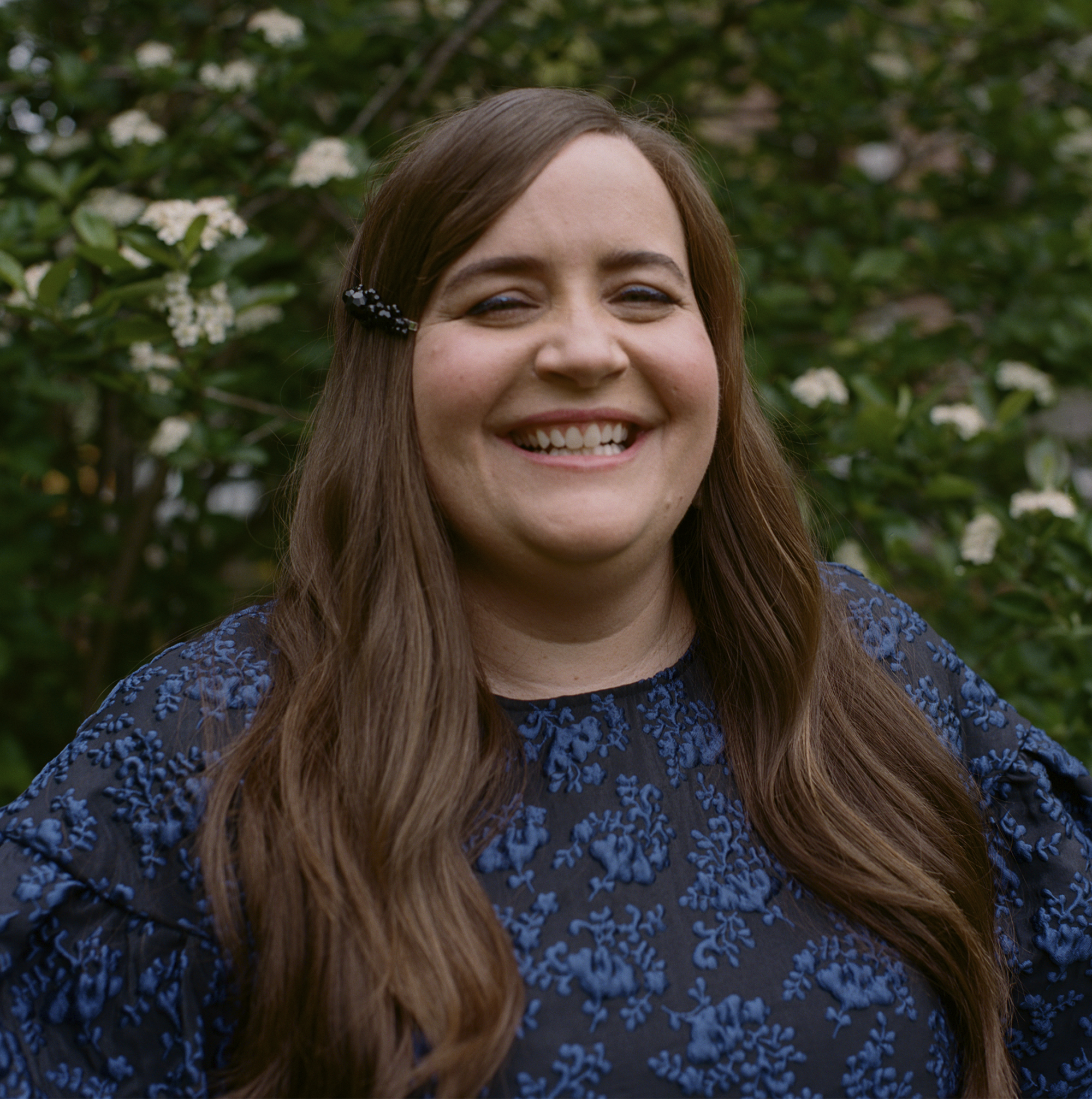
BROWNSTEIN: How have you balanced this sense of responsibility that you may not have placed upon yourself, that might be externally placed upon you, of being representational? With self-expression, creative license… How do you balance those two things as you made the show?
BRYANT: It is a weird thing, but honestly, maybe before I was on SNL, I really didn’t think about it that much. When I was at Second City or in Chicago doing shows, I would see it as, “I’m just a comedian, and here we go.” And when I got to SNL, I quickly realized audiences, especially a big multimillion person audience, they perceive you as something. To them, I’m not Aidy, I’m a fat woman. Being onscreen, I immediately represent that. And that was a big motivation for wanting to make Shrill in the first place—to make a show where we could acknowledge, yes this is a fat person, but she is not these things attached to that—cute, or jolly, or sweet. Or infantile, or nervous, or lazy. There’s just these assumptions about fat characters that I’ve certainly been offered parts around, and I can’t do that.
For this show, it was a really nice balance of feeling like we’re acknowledging this character’s experience, which is a fat woman navigating the world, but also we’re giving her pieces of her life that aren’t just about her being fat. And for any person who represents any piece of anything on screen, there’s a way where that just becomes the entire story for them. Whether it’s the color of their skin or their orientation, or anything. Now that’s their whole thing, and not always by their choosing. That’s just what they maybe represent, so it’s written in that way, or it’s perceived that way. And I feel like that was my favorite thing about doing this. Her body’s just a piece of her story. It really is a traditional story. It’s not this form-breaking show, but it’s from this perspective that’s really carefully balanced, and you always get to see it that way. So that this character has a dynamic life, and a sexual life, and an emotional life—it’s all being represented here. And that felt good to me.
BROWNSTEIN: It’s interesting what you’re saying, that before you were on SNL, that identity indexer was not something at the forefront of your brain. It always takes someone else, essentially, to often point out to you who you are, which I find, often, very uncomfortable. Because we each see ourselves in multitudes and with contradictions. What I hear you saying is that Shrill gives you agency to say, “Listen. You might only see me in one way, as Aidy. And maybe you only see Annie in one way, at the beginning. But we’re going to write a fully lived-in life.” And hopefully, if an audience came in that way, they will be forced to be like, “Oh. This is just a great comedy, and it happens to deal with some of these body issues, but also it’s a show that anyone can relate to.”
BRYANT: Yeah. And the pilot does start with her having diet foods, or stretching her shirt over her knees, and doing these things. That’s where we introduced the character because those are familiar on some level. But it’s pretty quickly that we widened that world. That was always part of the pitch of the show, even when we were taking it out to different networks. We wanted to show a full character that isn’t defined by this one thing. There were times early on on SNL, where in a sketch I would be eating… This was back when I was on Twitter. Lord knows, I’m off it now.
BROWNSTEIN: Me, too. Amen.
BRYANT: I would get so many tweets of people being like, “Of course they have the fat woman eating on camera.” And I’m like, “Well, everyone else is eating in the scene. It was a dinner scene.” I had to eat an apple in one scene where I played Sarah Huckabee Sanders, and people were like, “They’re fat-shaming Sarah Huckabee Sanders.” And it was like, “No. I’m just a human woman eating food on camera, but because I’m fat, it feels triggering?” There was something really devastating about that to me, and that’s part of why I was like, “Okay, in the show, I want to show a fat person eating pasta, having sex, hanging out with friends, going to work, so you could get used to the idea of seeing someone do normal stuff.” It’s kind of rough.
BROWNSTEIN: Yeah. It is heartbreaking, to have part of your audience that you wanted to feel seen, feel sometimes the most vulnerable or the most misrepresented. Because in reality, that’s part of who you wanted to quell and not offend. That’s always tricky. I’m glad you’re off Twitter.
BRYANT: Me too. Everybody should get off Twitter.
BROWNSTEIN: I love this season of SNL, and in the last couple of years, obviously it’s not unprecedented, but it does feel like you and Kate [McKinnon] in particular have started playing a multitude of male characters. And I’m wondering if that was a discussion, if that was actually stated as a desire? Or has it just organically started being included into the writing of the show?
BRYANT: I don’t know that it was a true discussion. Maybe. But in our early days on the show, Kate was doing a ton of impressions of famously hot women. And I was also playing a lot of girly girls. It was almost a natural inclination, honestly, closer to who both of us are, which is a little more grounded and dorky, that we ended up writing towards that stuff. I mean, we did one skit on Saturday where we both played teen boys. It’s more of a comfort zone.
BROWNSTEIN: I like that.
BRYANT: We’re getting away with it. And I feel like, maybe in our early days, I don’t know if we could have gotten away with it quite in the same way. I definitely remember watching the show and seeing tons of women played by men. Like Linda Tripp, or people like that, and I remember being like, “Damn. That’s tough sometimes.” But I feel like we do it from more a playful place than some of the early versions of men playing female characters as an indictment on the looks of that women. It wasn’t an active choice, but it’s something that we’ve fallen into that we both really love. Because it feels that you just get to settle in and be stupid, in the best way possible.
BROWNSTEIN: A breakthrough on SNL in that world was when Melissa McCarthy played Sean Spicer. There was sort of this floodgate. I do like how it deconstructs gender in a way that we’ve all started to deconstruct it. There is something really revealing about a Ted Cruz, or even the study buddy characters that you guys played the other night. There is something about a teenage boy—what they represent in terms of classic maleness is just funny.
BRYANT: Totally! Well I also think that with Ted Cruz, so much of his story is the way his wife was treated by Trump, or by the way his young daughters were a part of the Cancun story. So naturally, me playing him, there is an empathy for the women that is naturally there, that I wonder if it would be there in the same way, if one of the guys was playing Ted Cruz. There is a little bite to it.
BROWNSTEIN: It feels more complex, because you’re not just embodying Ted Cruz, but what he represents, and what he represents to women even in his own family. My last question is an easy one, hopefully. Now that you know and feel confident in your ability to have your own show and write and produce and act and be in the center of it, is that something that you feel like you’ll continue to do? You don’t have to give me a pitch or anything.
BRYANT: Yeah! I loved this so much. In many ways, I found my place. It gives me this path forward, and lots of ideas. They still deal with themes that are important to me that probably overlap with Shrill, but from really different angles or approaches. I feel excited to leave behind how personal Shrill was, on some level, and get deeper into the creating of worlds and stuff like that. Because that was some of what I loved the most. It’s not that I didn’t love digging through some of the stuff in Shrill, but it was really personal. And so sometimes just the sheer making of it was emotionally exhausting in a way that felt, maybe more than what I wanted to get into at times. But I’m really proud of it and, certainly for what Lindy [West] and Ali Rushfield, our showrunner, and I set out to do, we did it. And that feels like enough juice to put in my tank and head on off to the next one. Thanks for doing this, Carrie. Oh my god, I love you.
BROWNSTEIN: Thank you deeply. I love you, too. I’ll talk to you soon without an audience. But thank you to our audience.
BRYANT: Thank you to our audience!

